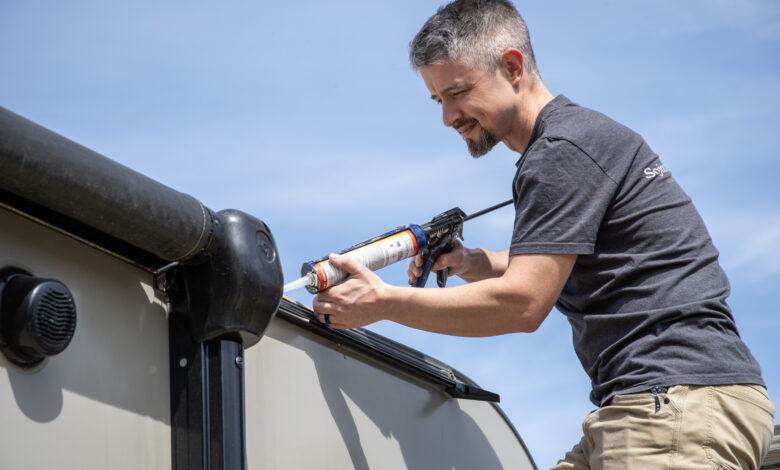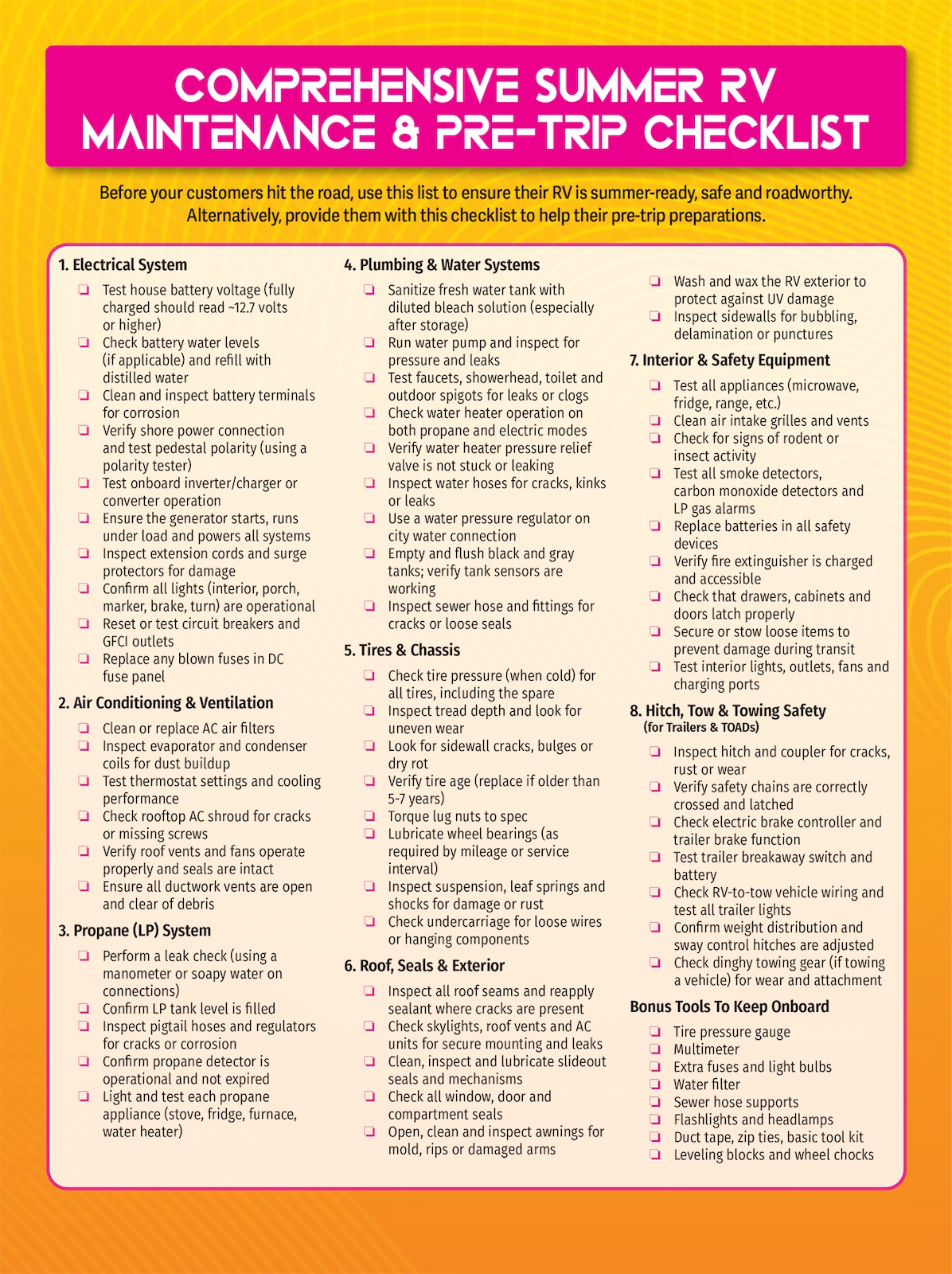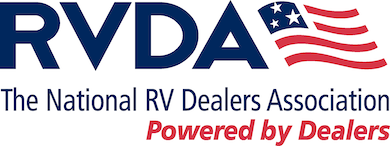Features
Comprehensive Summer RV Maintenance & Pre-Trip Checklist
Get your customers road-ready with this summer RV maintenance checklist for safe, smooth travel.

Before your customers hit the road, use this list to ensure their RV is summer-ready, safe and roadworthy. Alternatively, provide them with this checklist to help their pre-trip preparations.
1. Electrical System
- Test house battery voltage (fully charged should read ~12.7 volts or higher)
- Check battery water levels (if applicable) and refill with distilled water
- Clean and inspect battery terminals for corrosion
- Verify shore power connection and test pedestal polarity (using a polarity tester)
- Test onboard inverter/charger or converter operation
- Ensure the generator starts, runs under load and powers all systems
- Inspect extension cords and surge protectors for damage
- Confirm all lights (interior, porch, marker, brake, turn) are operational
- Reset or test circuit breakers and GFCI outlets
- Replace any blown fuses in DC fuse panel
2. Air Conditioning & Ventilation
- Clean or replace AC air filters
- Inspect evaporator and condenser coils for dust buildup
- Test thermostat settings and cooling performance
- Check rooftop AC shroud for cracks or missing screws
- Verify roof vents and fans operate properly and seals are intact
- Ensure all ductwork vents are open and clear of debris
3. Propane (LP) System
- Perform a leak check (using a manometer or soapy water on connections)
- Check LP tank level and confirm it’s filled
- Inspect pigtail hoses and regulators for cracks or corrosion
- Confirm propane detector is operational and not expired
- Light and test each propane appliance (stove, fridge, furnace, water heater)
4. Plumbing & Water Systems
- Sanitize fresh water tank with diluted bleach solution (especially after storage)
- Run water pump and inspect for pressure and leaks
- Test faucets, showerhead, toilet and outdoor spigots for leaks or clogs
- Check water heater operation on both propane and electric modes
- Verify water heater pressure relief valve is not stuck or leaking
- Inspect water hoses for cracks, kinks or leaks
- Use a water pressure regulator on city water connection
- Empty and flush black and gray tanks; verify tank sensors are working
- Inspect sewer hose and fittings for cracks or loose seals
5. Tires & Chassis
- Check tire pressure (when cold) for all tires, including the spare
- Inspect tread depth and look for uneven wear
- Look for sidewall cracks, bulges or dry rot
- Verify tire age (replace if older than 5-7 years)
- Torque lug nuts to spec
- Lubricate wheel bearings (as required by mileage/service interval)
- Inspect suspension, leaf springs and shocks for damage or rust
- Check undercarriage for loose wires or hanging components
6. Roof, Seals & Exterior
- Inspect all roof seams and reapply sealant where cracks are present
- Check skylights, roof vents and AC units for secure mounting and leaks
- Clean, inspect and lubricate slideout seals and mechanisms
- Check all window, door and compartment seals
- Open, clean and inspect awnings for mold, rips or damaged arms
- Wash and wax the RV exterior to protect against UV damage
- Inspect sidewalls for bubbling, delamination or punctures
7. Interior Inspection & Safety Equipment
- Test all appliances (microwave, fridge, range, etc.)
- Clean air intake grilles and vents
- Check for signs of rodent or insect activity
- Test all smoke detectors, carbon monoxide detectors and LP gas alarms
- Replace batteries in all safety devices
- Verify fire extinguisher is charged and accessible
- Check that drawers, cabinets and doors latch properly
- Secure or stow loose items to prevent damage during transit
- Test interior lights, outlets, fans and charging ports
8. Hitch, Tow & Towing Safety (for Trailers & TOADs)
- Inspect hitch and coupler for cracks, rust or wear
- Verify safety chains are correctly crossed and latched
- Check electric brake controller and trailer brake function
- Test trailer breakaway switch and battery
- Check RV-to-tow vehicle wiring and test all trailer lights
- Confirm weight distribution and sway control hitches are adjusted
- Check dinghy towing gear (if towing a vehicle) for wear and attachment
Bonus Tools To Keep Onboard
- Tire pressure gauge
- Multimeter
- Extra fuses and light bulbs
- Water filter
- Sewer hose supports
- Flashlights and headlamps
- Duct tape, zip ties, basic tool kit
- Leveling blocks and wheel chocks
Click here for more detailed information about summer maintenance tips for your RV customers.




